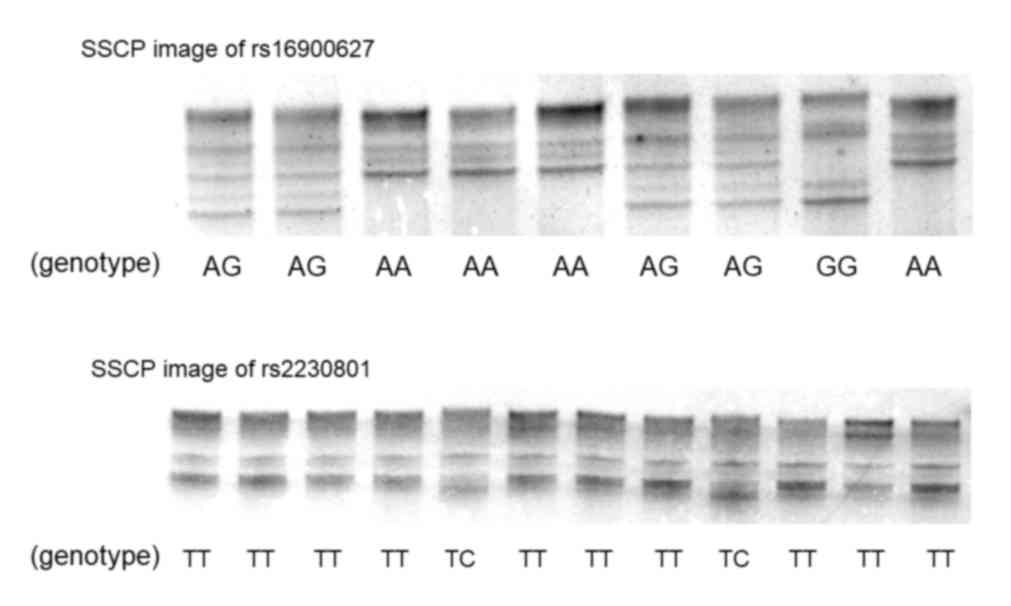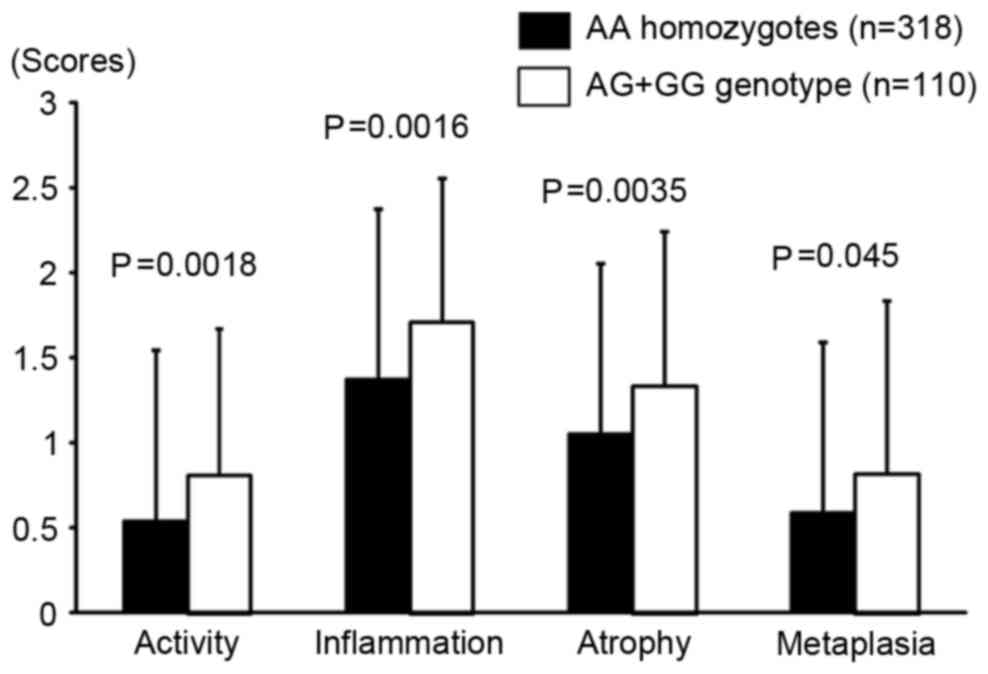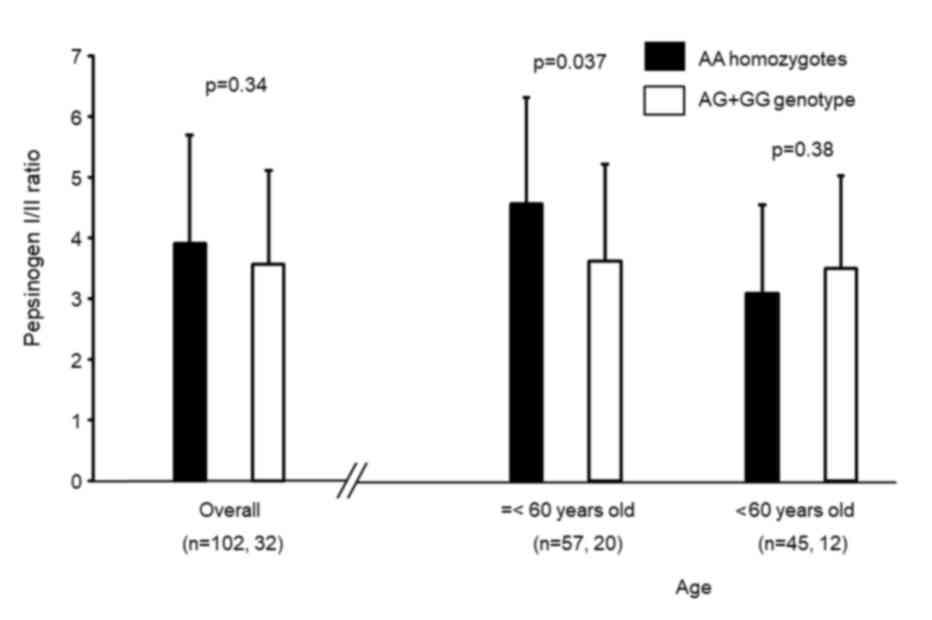|
1
|
Blaser MJ and Parsonnet J: Parasitism by
the ‘slow’ bacterium Helicobacter pylori leads to altered gastric
homeostasis and neoplasia. J Clin Invest. 94:4–8. 1994. View Article : Google Scholar : PubMed/NCBI
|
|
2
|
Huang JQ, Sridhar S, Chen Y and Hunt RH:
Meta-analysis of the relationship between Helicobacter pylori
seropositivity and gastric cancer. Gastroenterology. 114:1169–1179.
1998. View Article : Google Scholar : PubMed/NCBI
|
|
3
|
Uemura N, Okamoto S, Yamamoto S, Matsumura
N, Yamaguchi S, Yamakido M, Taniyama K, Sasaki N and Schlemper RJ:
Helicobacter pylori infection and the development of gastric
cancer. N Engl J Med. 345:784–789. 2001. View Article : Google Scholar : PubMed/NCBI
|
|
4
|
Correa P: Human gastric carcinogenesis: A
multistep and multifactorial process-First American Cancer Society
Award Lecture on Cancer Epidemiology and Prevention. Cancer Res.
52:6735–6740. 1992.PubMed/NCBI
|
|
5
|
Crabtree JE: Gastric mucosal inflammatory
responses to Helicobacter pylori. Aliment Pharmacol Ther. 10 Suppl
1:S29–S37. 1996. View Article : Google Scholar
|
|
6
|
Rosenstiel P, Hellmig S, Hampe J, Ott S,
Till A, Fischbach W, Sahly H, Lucius R, Fölsch UR, Philpott D and
Schreiber S: Influence of polymorphisms in the NOD1/CARD4 and
NOD2/CARD15 genes on the clinical outcome of Helicobacter pylori
infection. Cell Microbiol. 8:1188–1198. 2006. View Article : Google Scholar : PubMed/NCBI
|
|
7
|
Tigno-Aranjuez JT and Abbott DW:
Ubiquitination and phosphorylation in the regulation of NOD2
signaling and NOD2-mediated disease. Biochim Biophys Acta.
1823:2022–2028. 2012. View Article : Google Scholar : PubMed/NCBI
|
|
8
|
Kim DJ, Park JH, Franchi L, Backert S and
Núñez G: The Cag pathogenicity island and cooperative interaction
between TLR2/NOD2 and NLRP3 regulate IL-1β production in
Helicobacter pylori-infected dendritic cells. Eur J Immunol.
43:2650–2658. 2013. View Article : Google Scholar : PubMed/NCBI
|
|
9
|
Ogura Y, Inohara N, Benito A, Chen FF,
Yamaoka S and Nunez G: Nod2, a Nod1/Apaf-1 family member that is
restricted to monocytes and activates NF-kappaB. J Biol Chem.
276:4812–4818. 2001. View Article : Google Scholar : PubMed/NCBI
|
|
10
|
Li ZX, Wang YM, Tang FB, Zhang L, Zhang Y,
Ma JL, Zhou T, You WC and Pan KF: NOD1 and NOD2 genetic variants in
association with risk of gastric cancer and its precursors in a
Chinese population. PLoS One. 10:e01249492015. View Article : Google Scholar : PubMed/NCBI
|
|
11
|
Li J, Tian J, Ma Y, Cen H, Leng RX, Lu MM,
Chen GM, Feng CC, Tao JH, Pan HF and Ye DQ: Association of RIP2
gene polymorphisms and systemic lupus erythematosus in a Chinese
population. Mutagenesis. 27:319–322. 2012. View Article : Google Scholar : PubMed/NCBI
|
|
12
|
Nakashima K, Hirota T, Suzuki Y, Akahoshi
M, Shimizu M, Jodo A, Doi S, Fujita K, Ebisawa M, Yoshihara S, et
al: Association of the RIP2 gene with childhood atopic asthma.
Allergol Int. 55:77–83. 2006. View Article : Google Scholar : PubMed/NCBI
|
|
13
|
Liu J, He C, Xu Q, Xing C and Yuan Y: NOD2
polymorphisms associated with cancer risk: A meta-analysis. PLoS
One. 9:e893402014. View Article : Google Scholar : PubMed/NCBI
|
|
14
|
Castaño-Rodríguez N, Kaakoush NO, Goh KL,
Fock KM and Mitchell HM: The role of TLR2, TLR4 and CD14 genetic
polymorphisms in gastric carcinogenesis: A case-control study and
meta-analysis. PLoS One. 8:e603272013. View Article : Google Scholar : PubMed/NCBI
|
|
15
|
Lauren P: The two histological main types
of gastric carcinoma: Diffuse and so-called intestinal-type
carcinoma. An attempt at a histo-clinical classification. Acta
Pathol Microbiol Scand. 64:31–49. 1965. View Article : Google Scholar : PubMed/NCBI
|
|
16
|
Dixon MF, Genta RM, Yardley JH and Correa
P: Classification and grading of gastritis. The updated sydney
system. International Workshop on the Histopathology of Gastritis,
Houston 1994. Am J Surg Pathol. 20:1161–1181. 1996. View Article : Google Scholar : PubMed/NCBI
|
|
17
|
Sherry ST, Ward MH, Kholodov M, Baker J,
Phan L, Smigielski EM and Sirotkin K: dbSNP: The NCBI database of
genetic variation. Nucleic Acids Res. 29:308–311. 2001. View Article : Google Scholar : PubMed/NCBI
|
|
18
|
Arisawa T, Tahara T, Ozaki K, Matsue Y,
Minato T, Yamada H, Nomura T, Hayashi R, Matsunaga K, Fukumura A,
et al: Association between common genetic variant of HRH2 and
gastric cancer risk. Int J Oncol. 41:497–503. 2012. View Article : Google Scholar : PubMed/NCBI
|
|
19
|
Algood HM and Cover TL: Helicobacter
pylori persistence: An overview of interactions between H. pylori
and host immune defenses. Clin Microbiol Rev. 19:597–613. 2006.
View Article : Google Scholar : PubMed/NCBI
|
|
20
|
Rad R, Ballhorn W, Voland P, Eisenächer K,
Mages J, Rad L, Ferstl R, Lang R, Wagner H, Schmid RM, et al:
Extracellular and intracellular pattern recognition receptors
cooperate in the recognition of Helicobacter pylori.
Gastroenterology. 136:2247–2257. 2009. View Article : Google Scholar : PubMed/NCBI
|
|
21
|
Tahara T, Arisawa T, Wang F, Shibata T,
Nakamura M, Sakata M, Hirata I and Nakano H: Toll-like receptor 2
−196 to 174del polymorphism influences the susceptibility of
Japanese people to gastric cancer. Cancer Sci. 98:1790–1794. 2007.
View Article : Google Scholar : PubMed/NCBI
|
|
22
|
Rigoli L, Di Bella C, Fedele F, Procopio
V, Amorini M, Lo Giudice G, Romeo P, Pugliatti F, Finocchiaro G,
Lucianò R and Caruso RA: TLR4 and NOD2/CARD15 genetic polymorphisms
and their possible role in gastric carcinogenesis. Anticancer Res.
30:513–517. 2010.PubMed/NCBI
|
|
23
|
Hnatyszyn A, Szalata M, Stanczyk J, Cichy
W and Slomski R: Association of c.802C>T polymorphism of
NOD2/CARD15 gene with the chronic gastritis and predisposition to
cancer in H. pylori infected patients. Exp Mol Pathol. 88:388–393.
2010. View Article : Google Scholar : PubMed/NCBI
|
|
24
|
Watanabe T, Asano N, Fichtner-Feigl S,
Gorelick PL, Tsuji Y, Matsumoto Y, Chiba T, Fuss IJ, Kitani A and
Strober W: NOD1 contributes to mouse host defense against
Helicobacter pylori via induction of type I IFN and activation of
the ISGF3 signaling pathway. J Clin Invest. 120:1645–1662. 2010.
View Article : Google Scholar : PubMed/NCBI
|
|
25
|
Marcinek P, Jha AN, Shinde V,
Sundaramoorthy A, Rajkumar R, Suryadevara NC, Neela SK, van Tong H,
Balachander V, Valluri VL, et al: LRRK2 and RIPK2 variants in the
NOD 2-mediated signaling pathway are associated with susceptibility
to Mycobacterium leprae in Indian populations. PLoS One.
8:e731032013. View Article : Google Scholar : PubMed/NCBI
|
|
26
|
Huang YK, Yu JC, Kang WM, Ma ZQ, Ye X,
Tian SB and Yan C: Significance of serum pepsinogens as a biomarker
for gastric cancer and atrophic gastritis screening: A systematic
review and meta-analysis. PLoS One. 10:e01420802015. View Article : Google Scholar : PubMed/NCBI
|
|
27
|
Lee JY, Kim N, Lee HS, Oh JC, Kwon YH,
Choi YJ, Yoon KC, Hwang JJ, Lee HJ, Lee A, et al: Correlations
among endoscopic, histologic and serologic diagnoses for the
assessment of atrophic gastritis. J Cancer Prev. 19:47–55. 2014.
View Article : Google Scholar : PubMed/NCBI
|
|
28
|
Go MF: Review article: Natural history and
epidemiology of Helicobacter pylori infection. Aliment Pharmacol
Ther. 16 Suppl 1:S3–S15. 2002. View Article : Google Scholar
|

















